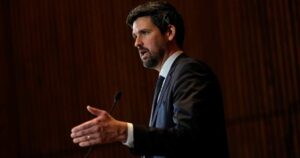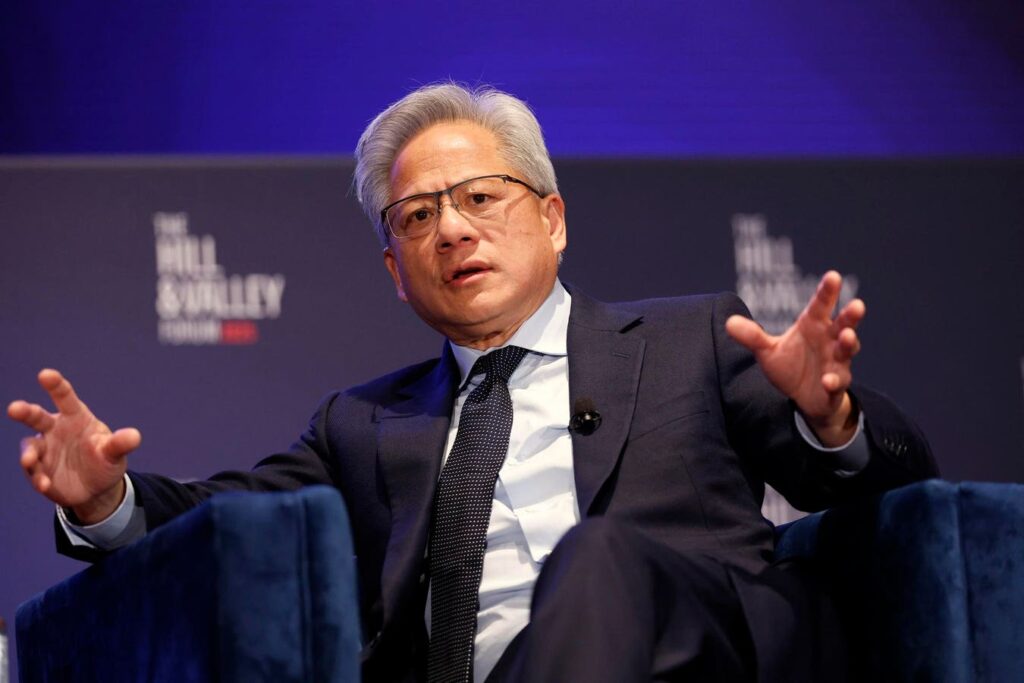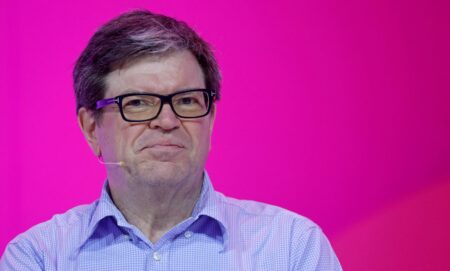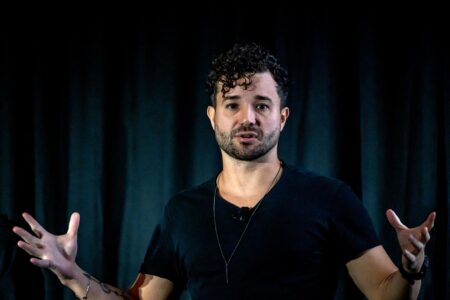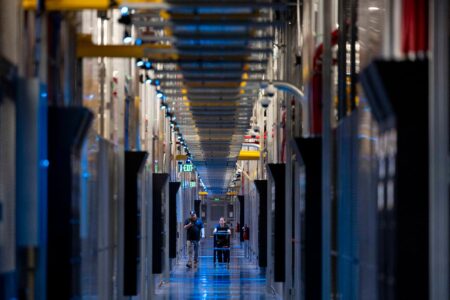“I’ve never seen a startup take off like that before.” That was Nvidia’s cofounder and CEO Jensen Huang’s take on Nscale, a tiny London-based startup that pivoted from mining crypto to winning deals to power OpenAI’s data centers in just two years.
Nscale has emerged as one of the biggest winners from the $200 billion of deals announced last week as part of President Donald Trump’s state visit to the United Kingdom. The startup, which is one of a new crop of “neocloud” companies like Coreweave that run the GPU-powered datacenters underpinning the current AI boom, landed a $500 million investment last week from Nvidia, and a deal with the chip giant and OpenAI to build one of its massive “Stargate” data centers in the U.K.
As Huang took to the stage with British Prime Minister Keir Starmer in London Thursday night he name checked Nscale’s CEO Josh Payne. “Three months ago, when I met Josh, they were zero billion dollars [revenue]. Today, Josh is zero billion dollars [revenue], but with potential,” said Huang. “In just three months, we have helped Josh set up Nscale and they are underway to scaling up to 300,000 GPUs around the world…and 60,000 here in the U.K.”
That grand a buildout would put the little-known startup on par with Nasdaq-listed CoreWeave which claimed to be operating some 250,000 in GPUs in its March IPO prospectus. Coreweave’s stock market value has leapt to $60 billion since then, and just six years after its own pivot from crypto mining.
Huang appears to have even more ambitious plans for Nscale. In a video shared on Linkedin last week, he handed Nscale’s CEO a bottle of Johnnie Walker whisky he said was signed with the quip: “Zero to $50 billion in 18 months.” Nvidia and Nscale declined to comment on the timeframe for the startup to deploy 300,000 GPUs, hit this valuation, or the current valuation at the time of this $500 million investment.
In an August interview with Forbes, Nscale CEO Payne declined to say how many GPUs the company had currently deployed but said it had 40 megawatts of AI capacity online. That’s far less than rival Coreweave which has 1.3 gigawatts of capacity and announced plans for a U.K. datacenter of its own last week. Meanwhile Amsterdam-listed operator Nebius said it had plans to sign deals to access over 1 gigawatts of electricity by the end of 2026.
Nvidia’s Huang has emerged as a key booster of the companies trying to meet the seemingly limitless demand for compute from the AI sector. With origin stories in crypto, many of these firms might have seemed unlikely partners for the world’s most valuable company a few years ago. But now they could be critical to its future. Tech giants like Google, Amazon and Meta are huge customers for Nvidia but also have advanced programs to design and build their AI chips which one day could rival, or replace, Nvidia’s. Neoclouds help hedge Nvidia’s reliance on sales to the existing giants of cloud computing.
Nscale’s Payne told Forbes in August that it also got its start in mining cryptocurrencies. The company in August 2023 was “spun out” of an equally obscure Australian crypto miner Arkon Energy that had flirted with a SPAC listing. After the split, Nscale was left with a data center in a remote northern Norwegian town, Glomfjord, that like Coreweave and Crusoe, was retooled from mining crypto to powering AI startups. Arkon’s website is now offline and Nscale spokesperson Tom Broughton of the Hoffman Agency said that it now remained only as a holding company for Nscale stock.
With demand for AI data centers booming, Nscale raised $155 million from investors in December 2024 with some of the financing coming from the listing of convertible notes on the International Stock Exchange Group, a backwater stock market based on Guernsey, a tiny island in the English Channel. The company hired data center veterans with experience from Iron Mountain, Google and Amazon Web Services along with Imran Shafi, the British government’s former director of AI opportunities.
In July, Nscale broke into the big leagues with a deal to build OpenAI’s first “Stargate” AI data center in Norway’s Arctic circle as part of a deal with Norwegian billionaire Kjell Inge Røkke’s Aker industrial conglomerate. “We operate in Norway exclusively today. We’re doing deployments in about five countries over the space of the next six months and our intention over the next two years is to be in about 15 European countries,” Payne told Forbes in August.
Currently Nscale’s website only has details of its Glomfjord data center, which it says operates with just 30 megawatts of capacity. “Nscale has multiple data centres including Nscale owned and colocated. Due to security and client sensitivities, we do not share the details of our full global footprint,” said Broughton on behalf of Nscale.
In addition to its deal with OpenAI to build a 30,000 GPU “Stargate” facility in the U.K., Nscale separately signed a deal for Microsoft to lease an unfinished 50 megawatt data centre in south west England it had only bought months earlier. These projects are a fraction of the size of the original “Stargate” project, a 4.5 gigawatt data center, that OpenAI is building in Abilene, Texas, with Oracle and Crusoe.
Despite its Australian origins, and backing from mostly American “opportunistic hedge fund investors,” Nscale is pitching itself as an European “sovereign” alternative to Silicon Valley’s hyper-scalers. “Europe lacks AI infrastructure that’s European sovereign, that’s something we’re working fiercely to solve,” said Payne.
Nscale wasn’t the only tech bet that Huang talked up on his U.K. tour. The Nvidia cofounder said he planned to invest over $2.7 billion in digital bank Revolut, self-driving car Wayve and other British startups. “I look forward to making a fortune off you,” he told founders at the London event.
Read the full article here



